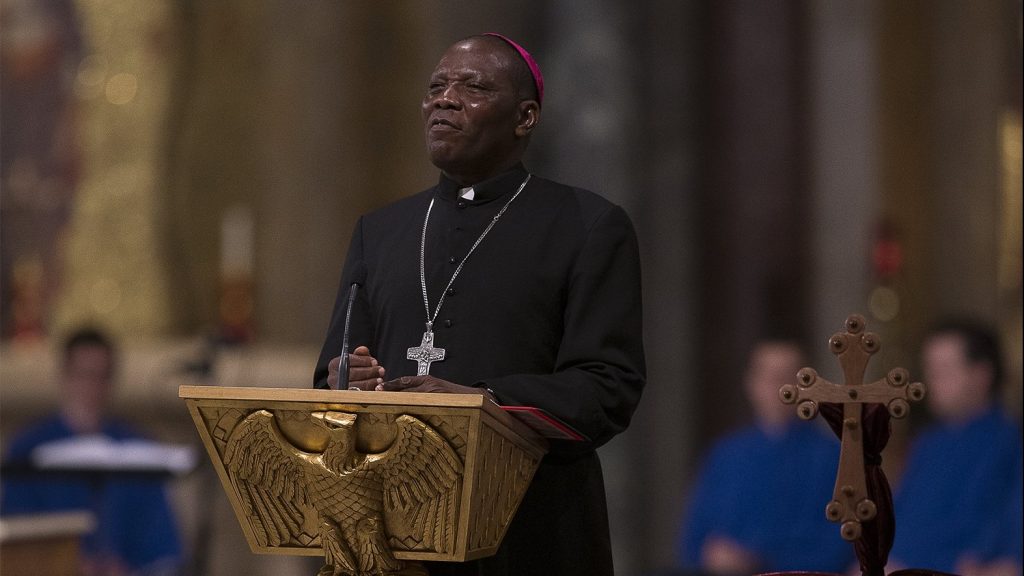A vision of Christ helped give Bishop Oliver Dashe Doeme of Maiduguri, Nigeria, hope for the eventual end of the Islamic terrorist group Boko Haram, after the kidnapping of 276 schoolgirls in the remote town of Chibok in April 2014.
"I was in pain. I went into my chapel, as I always do, to pray the rosary," Bishop Doeme said during a July 26 webinar sponsored by Aid to the Church in Need, the international organization and papal charity that helps threatened communities of faith.
He said Christ appeared "as a vision" at the right side of the altar. "I dropped the rosary I was holding," he recalled.
Christ's message, he said was "'Boko Haram is gone.' He said it three times and was gone."
Bishop Doeme said he was "totally shaken" by the experience and didn't tell anyone about it for a year, and when he told them, "they were very happy."
Fifty-seven girls escaped from Boko Haram on the day of the kidnapping. About 100 are still missing, and one was found as recently as June of this year.
"With Mother Mary on our side, victory is ours," Bishop Doeme added.
The webinar was titled, "Is Boko Haram defeated? Life under the perpetual shadow of violence."
From 2009 to 2019, according to ACN statistics, Boko Haram displaced 25 priests from their parishes, 45 nuns from their convents, and more than 100,000 Catholics.
"They targeted our churches, our priests, our rectories and destroyed the structures in those places, " Bishop Doeme said.
His diocese, in northeastern Nigeria, is the birthplace of Boko Haram, and between 2009 and 2018, the terrorist group killed 1,500 people in the diocese.
The group has largely been driven out of several provinces in the region by the Nigerian military -- with assistance from Benin, Cameroon, Chad and Niger. It still retains control over some villages and pockets of territory and continues to launch deadly suicide attacks and abduct civilians, mostly women and children.
Bishop Doeme spoke of a positive outcome following a Boko Haram kidnapping of scores of children hiding in an Islamic seminary in Niger state in May 2021.
Because the diocese is consecrated to the Immaculate Heart of Mary, "wonders have been happening. They would have slaughtered our children. But they didn't get anybody."
"I am the living testimony of our Lord's protection," the bishop added. "So it has been victory after victory."
The diocese has an estimated 163,700 Catholics.
"As history shows, any time there is persecution, the church becomes more alive ... and more vibrant. Our people have become unshakable in faith," Bishop Doeme said.
The peak years for Boko Haram attacks were 2014 and 2015, with more than 350 throughout Nigeria. The number last year dwindled to about 70.
According to a Council on Foreign Relations report cited by the U.S. State Department in a 2021 summary of religious freedom around the globe, last year Nigeria had 1,112 deaths from violence among ethnic groups, herdsmen and farmers.
The report said groups -- including Boko Haram and the Islamic State-West Africa -- attacked population centers and religious targets, including churches and mosques, and maintained an ability to stage forces in rural areas and launch attacks against civilian and military targets across the northeast sector of Nigeria.
However, the report stated that Secretary of State Antony Blinken "determined that Nigeria did not meet the criteria to be designated as a Country of Particular Concern for engaging in or tolerating particularly severe violations of religious freedom or as a Special Watch List country for engaging in or tolerating severe violations of religious freedom under the International Religious Freedom Act of 1998 when such designations were announced on Nov. 15, 2021."
Aid to the Church in Need was founded in 1947 originally to assist displaced communities after World War II. It serves more than 145 countries.

